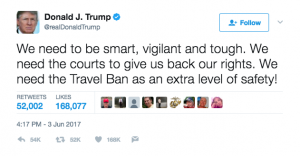 Donald J. Trump likes to tweet. He has turned to Twitter to announce his Director of the FBI nomination, criticize his critics and his thoughts on why the ratings were poor for The Apprentice.
Donald J. Trump likes to tweet. He has turned to Twitter to announce his Director of the FBI nomination, criticize his critics and his thoughts on why the ratings were poor for The Apprentice.
While pundits have been talking for days on how seriously people should take his tweets, there is another discussion taking place regarding the constitutionality of how he manages his Twitter account.
It seems @realDonalTrump has blocked several accounts that reply to his tweets with comments that are, shall we say, not very nice (and really, who could blame him?). Twitter users are unable to see or respond to tweets from accounts that block them and there-in lies the potential problem.
The Knight First Amendment Institute at Columbia University in New York sent a letter to President Trump, requesting he unblock certain Twitter users on the grounds it violates the First Amendment of the U.S. Constitution. They claim blocking the tweets is a form of suppressed speech in a public forum which is protected.
President Trump isn’t the first politician to block users, members of congress, governors and other elected officials have all blocked/deleted people on various social media channel. The problem, according to Deborah Jeon, American Civil Liberties Union legal director, is that many politicians are using social media in place of town hall meetings. It makes sense in the fact that it’s much easier to control the conversation.
Legal experts have said that President Trump’s tweets have effected public policy, hampering efforts to have his so-called travel ban become law. It has also been reported that many White House staffers learn of new initiatives by his tweets.
So where could this lead us to? Most likely that proverbial road to the courthouse.
